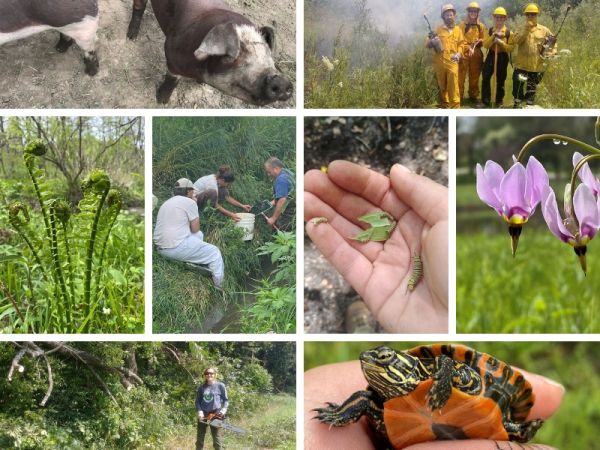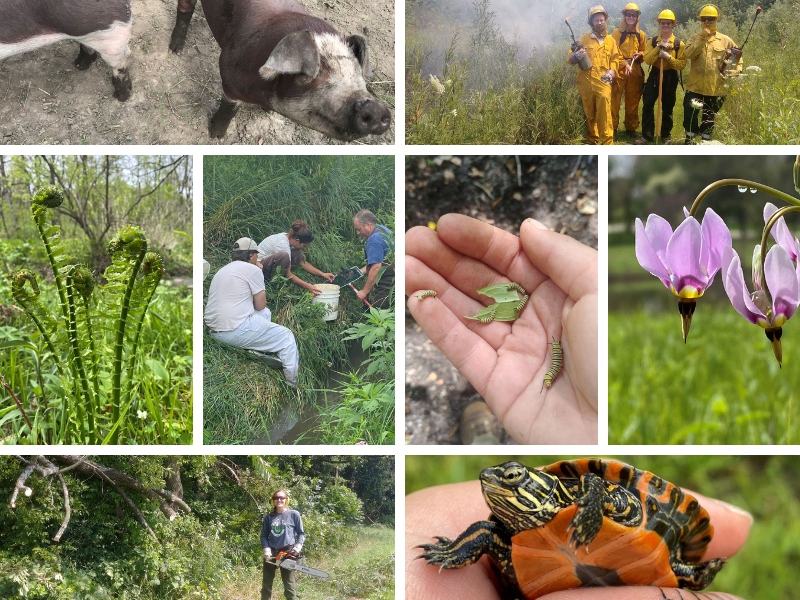
CLIP Program Details: Skills gained
CLIP Program Details: Skills gained

Land management: Invasive removal, site preparation and restoration techniques will be reviewed for ongoing TLC restoration projects. Transline resistant communities, use of parasitic plants, grazing and cover crops will be studied at TLC and at some field trip locations (i.e. Nachusa grasslands).
Plant identification: CLIPterns will learn the difference between: native, non-native and exotic invasive plant species common to the Chicago/Northern Illinois region. Vegetative ID characters will be used to identify plants (to species) within the following families: Apiaceae, Araceae, Asclepiadaceae, Asteraceae, Brassicaceae, Caryophyllaceae, Gentianaceae, Fabaceae, Cyperaceae, Convallariaceae, Iridaceae, Liliaceae, Lamiacea, Juncaceae, Orchidaceae, Onagraceae, Orobanchaeceae, Poaceae, Polemoniaceae, Rosaceae, Ranunculaceae, Schrophulariacea, Violacea, among others. Common and latin names will be reviewed for each species.
GIS/GPS training: Geographic Information Systems are used in the field of conservation to track spatial data such as: rare and common plant populations, invasive species removal work, water features, historic plant communities, or just about anything you can put on a map! CLIP participants will be introduced to ARCMap (online and desktop version), Collector by ARCgis, Avenza Maps and Solocator; each of which are spatial data tools that help users navigate and collect data in the field.
Prescribed fire training: Historically, much of Illinois experienced wildfire on a regular basis. This kept woody brush at bay and allowed the prairie to thrive. Today we use prescribed fire to simulate wild fires on the land to gain desirable management outcomes (reduced brush and reduced invasive species along with readily available nutrients from leftover ash). CLIP participants will learn about prescribed fire as a tool for land management. Safety, equipment/tools, proper protective equipment, chain of command, weather, fuel types, site prep and mop up (among other information) will be discussed. Participation in an actual prescribed fire remains weather dependent.
Herbicide use: Chemical control of invasive plant species is a method often used to reduce or eliminate undesirable plant species from a natural area. CLIP participants will become familiar with various types of herbicide utilized in everyday restoration activites such as: round up, and garlon. Safe preparation, storage and usage of these chemicals will be reviewed. CLIP participants will learn how to utilze herbicide to combat vegetative and woody species using methods such as foliar spraying and cut stump treatments.
Rare plant monitoring: In partnership with the Chicago Botanic Garden TLC monitors Plants of Concern that are found growing on TLC land. Participants will become familiar with methods used to collect plants of concern data including: Species ID, population counts, management history, habitat quality, population location and data entry.
Wildlife/Stream surveys: Fresh water macro invertebrates, fish, mollusks and other insects can indicate the health and quality of a stream. In collaboration with TLC board members, CLIP participants will visit a TLC site to assess the quality of a stream by collecting species data along the length of a stream. Participants will gain stream specimen collection and identification skills.
Regenerative farming techniques: Regenerative farming works to put organic material back into the soil through the use of conservative soil farming techniques such as permaculture and no till agriculture. CLIPterns will visit and learn about TLC’s Apple Creek Regenerative Farm program and visit several local area farms to learn about how different farming techniques change the soil over time.
Land preservation techniques: Conservation easement, Wetland Reserve Easement, Land Donation, Conservation@, Conservation Stewardship Program and Agricultural Land Easement are a few of the many types of land preservation strategies that we will review with CLIPterns.
Field safety: Proper protective equipment, the buddy system, communication, weather hazards, plant hazards, insect hazards and equipment safety/hazards will be reviewed at the beginning of the season with refreshers throughout the season.
Scientific research/Experimental design: Interns will read/discuss foundational papers in ecology and be trained to form: hypotheses, predictions and use sound ethics to design an experiment. Interested individuals may conduct a small research/project in any of the subject areas under the approval guidance of CLIP leaders.
Art in the natural world: Each CLIPtern will participate in TLC’s annual photo contest; a contest for amateur photographers in the McHenry area. Photos are displayed at TLC’s “Art of the Land” event that is held each November. Additionally, all participants will spend time in the field observing and drawing plants.
Career development/Professional networking: Resume building, interviewing skills, self-confidence and job negotiation will be reviewed with each CLIP participant. Each field trip will provide interns with one or more professional contacts along with connections for future summer job opportunities. Finally, career paths for academic, not for profit, for profit, state and federal jobs will be discussed. CLIP mentors will meet with each student to discuss their career aspirations and interests followed by guidance to achieve that goal.